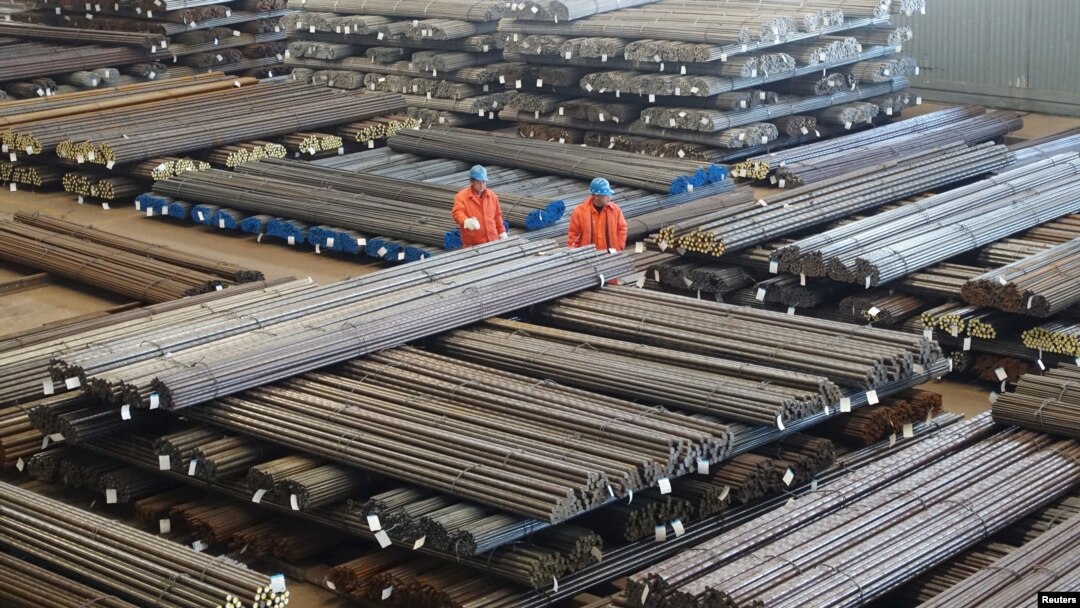President Donald Trump has ordered an investigation into whether foreign steel imports are damaging U.S. national security, saying his administration would "fight for American workers and American-made steel."
The probe is authorized under a rarely used section of a 1962 trade law that allows a president to restrict imports in cases where security interests are at stake.
"This has nothing to do with China," Trump insisted, adding, "This has to do with worldwide, what's happening. The dumping problem is a worldwide problem."
Steel industry
Surrounded by steel industry executives at an Oval Office signing ceremony Thursday, Trump clearly stated the probe was not directed at China, which has long been accused of dumping its excess steel production on U.S. markets.

U.S. President Donald Trump speaks before signing a directive ordering an investigation into the impact of foreign steel on the American economy in the Oval Office of the White House in Washington, April 20, 2017.
The president said the investigation could be completed within 50 days, far ahead of the nine months prescribed by law.
Shares of steel companies surged on news of the probe. The price of United States Steel Corporation stock was up more than 8 percent soon after the announcement.
"The important question is protecting our defense needs," said Commerce Secretary Wilbur Ross, who added the investigation is designed to find a balance between free trade and national security while building up the U.S. military. "And we will do whatever is necessary to do that."
Ross noted that steel imports rose nearly 20 percent in the first two months of this year, much of it from China, and now make up more than 26 percent of the entire American marketplace.
"Steel imports, despite measures already taken, have continued to rise despite repeated Chinese claims that they were going to reduce their steel capacity," he said. "Instead, they have actually been increasing it consistently."
Investigation sought
Steel industry executives attending Thursday's Oval Office ceremony applauded Trump's call for an investigation.
FILE - Ivanka Trump, daughter of then-Republican presidential candidate Donald Trump, center, tours Middletown Tube Works, a welded steel tube supplier, alongside owner Angela Phillips, left, in Middletown, Ohio, Oct. 6, 2016.
Mario Longhi, the CEO of U.S. Steel Corporation, said, "The signing of this executive order clearly demonstrates your understanding of the fundamental importance that our industry has, not just to the national economy, but to the national defense."
Trade experts and free market advocates, however, were skeptical of Trump's rationale for the investigation.
"It's just a bogus attempt to limit imports," said Dan Griswold, a research fellow at the Mercatus Center at Virginia's George Mason University.
Griswold said any move to restrict imports would be bad for U.S. industry and consumers because it would drive up prices for products that contain steel, from appliances to automobiles to new houses.
"But it will make certain steel producers and their politically active unions increase their profits and the gains they make by restricting competition," he said.
Issue of national security
Gary Hufbauer, senior fellow at the Peterson Institute of International Economics in Washington, questions the idea that dependence on foreign steel is a national security issue.
Hufbauer, who served as a senior Treasury Department official under former President Jimmy Carter, said the probe reflects the thinking of Commerce Secretary Ross, a billionaire investor with close ties to the steel industry.
FILE - U.S. Commerce Secretary Wilbur Ross holds a news conference at the Department of Commerce in Washington, March 10, 2017.
"It's not coming from the defense industry," Hufbauer said. "It's coming from the steelmakers, and key administration figures starting with Ross and others who feel the steel industry has been beset by steel from abroad and that's weakening the U.S. steel industry. But that's from a commercial standpoint, not a defense standpoint."
Ross stepped down from the board of the Luxembourg-based steel giant ArcelorMittal after accepting the job as Trump's commerce secretary.
A financial disclosure form he filed with the Office of Government Ethics shows Ross served on ArcelorMittal's board for nearly a decade, and was paid more than $100,000 in director's fees last year. He was also reported to have divested himself of between $750,000 and $1.5 million in equity holdings in the company, which is described on its home page as "the world's leading integrated steel and mining company."
Bloomberg News reported this week that while U.S. steelmakers may be counting on Trump to help business, any regulatory change could take years.
In a note to clients, Bloomberg Intelligence analyst Caitlin Webber wrote that changes would also likely be challenged at the World Trade Organization.


